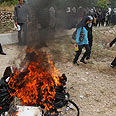
Palestinians burn settlement-made products
צילום: AP
Stifling the debate
Op-ed: New bill approves cheese boycott but stifles debate on major national issue like settlements
This bill is flawed first of all because of its twisted definition: “Geographical boycotts,” as if the whole matter here has to do with some coordinates on the map that we’re all forced to love.
And if the confusion created by the odd definition isn’t enough, the bill makes it clear that it has no intention to undermine boycotters over what it characterizes as “ideological motives,” such as the various cottage cheese boycotts.
In other words, we are allowed to utilize boycotts to fight against the price hikes of dairy producers here, and that’s an ideological boycott, but we must not utilize this weapon in struggling over an issue the has been tearing this nation apart for 44 years now – the territories conquered in the Six-Day War.
Boycotts are a bad thing. One does not need to be Knesset Member Zeev Elkin in order to understand that there is a problem with this scheme. On more than one occasion in our 2,000-year history, we were on the side that was boycotted to death, and hence there is a point and place to engage in a war against the boycotters.
Where is the line drawn?
However, the problem with this law, after we already exhausted the absurd separation between “ideological” and “not ideological,” is its sweeping tendency to fence in our democracy.
I am allowed to think that some of the Jewish settlements in the West Bank jeopardize the State of Israel’s existence. I am also allowed to think that if there is no other choice, these settlements need to be “dried up.” But I’m not allowed to let anyone know that this is what I think? Is this the idea? Because where exactly is the boundary between expressing an opinion and what the law shall characterize as a call for a boycott? A living room conversation is legitimate, but posting it on my blog is forbidden?
In this case, the problem is not the call for boycotts, and in any case the solution is not a ban on calling for boycotts. What we have here is a legitimate, longtime debate that will apparently not end tomorrow – with the new law or without it.
The attempt to force upon us in a twisted manner a stifled debate, by law, is bad, unwise, and mostly won’t work. This energy should have been invested in an attempt to focus the problem and seek legitimate, agreed-upon ways to argue over it.
- Follow Ynetnews on Facebook










